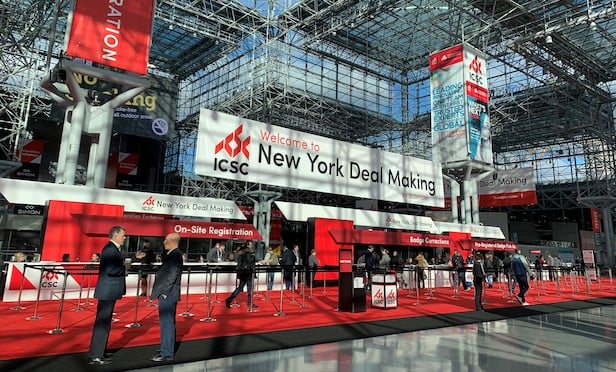 ICSC New York Deal Making, Javits Center/ Photo courtesy of ICSC
ICSC New York Deal Making, Javits Center/ Photo courtesy of ICSC
NEW YORK CITY— Nick Egelanian, the founder and president of the retail real estate consulting firm SiteWorks, said every time he turns on the TV, cable or network news, or reads any trade, business or general newspaper, everyone blames e-commerce for the decline in retail. But he says it's misinformation.
Total retail sales are approximately $5 trillion in the US. Egelanian noted internet retail accounted for 9.7% of sales in the second quarter of 2018. By 2022, this figure is projected to be 15%.
Amazon's total worldwide sales for all businesses reached approximately $179 billion in 2017. When deducting international sales, IT services like cloud storage, and other businesses including for other vendors on its site—Amazon's e-commerce in lieu of brick-and-mortar sales amounted to about 1% of US retail, he said.
So what caused the decline in retail—Sears' bankruptcy, the shuttering of Henri Bendel, and the closures of Lord & Taylor and J.C. Penney stores?
 Nick Egelanian, founder and president of SiteWorks/ Photo by Betsy Kim
Nick Egelanian, founder and president of SiteWorks/ Photo by Betsy KimEgelanian addressed such trends, speaking at the International Council of Shopping Centers (ICSC) New York Deal Making conference on Tuesday.
“I call it deconstruction of the department store. I hate when they talk about disruption because those people who disrupted are us,” he said. “We took apart the department stores and created big boxes.” This included linens, shoes, automobile services, specialty foods, pet supplies, electronics, almost every product one could imagine in a department store.
The retail real estate services advisor said it started with Toys R Us in the 1950s. This grew throughout the 1970s and by the 1980s it was a trend.
In 2007, value retailers (for example, TJ Maxx and Ross) had $18 billion in sales and department stores had $85 billion. By 2016, the value retailers grew to $75 billion and department stores had dropped to $26 billion in sales.
“It makes common sense. Things that were sold in department stores are now sold in big-box stores,” Egelanian said.
He predicted more change in the next three to five years. “As soon as big boxes are done killing what's left of the department stores, they will no longer grow. They will also reach maturity in an industry that is largely mature.”
He asserted the internet is altering retail but is not the cause of the department store demise. Egelanian said Amazon actually loses money with its e-commerce but makes a healthy profit with its other businesses in technology, entertainment, advertising and shipping.
Amazon is a vendor, acts as a third party distributor for other vendors and also provides marketplace listings where it is not involved in the distribution.
While department stores are closing, value retailer Dollar General opened 1,300 stores last year. Income disparity is real, he said. “They are opening stores catering to the lowest end of the market, a vastly growing portion of America that buys paycheck to paycheck.”
 The department store model has become obsolete, says Nick Egelanian./ Photo by Betsy Kim
The department store model has become obsolete, says Nick Egelanian./ Photo by Betsy KimOf retail, 85% is commodity retail or invisible retail, what people use and replenish using essential household funds. “The primary function of retail is to distribute goods and services that people need to live,” he said, adding nobody talks about this because it's not particularly sexy.
The other 15% of retail is discretionary retail what most people in the industry discuss. It's based on how good the shops are and the quality of the products. It's the experiential retail, with conversations of how creativity and innovation will save retail. Egelanian pointed to Rodeo Drive and Disney World as unique examples.
He asked how many people in the room shopped at Walmart in the last month. Approximately 15% of the audience raised their hands. He noted there are 4,700 Walmarts in the country and they have 27% of the grocery business in the country.
Egelanian stated most of the professionals in real estate are financially in a different position than 75% of the rest of the population. But he added “It's the invisible part of retail that's the busiest.”
This year's ICSC New York Deal Making event is at the Javits Center in New York, scheduled for December 4-6.
© Touchpoint Markets, All Rights Reserved. Request academic re-use from www.copyright.com. All other uses, submit a request to [email protected]. For more inforrmation visit Asset & Logo Licensing.







